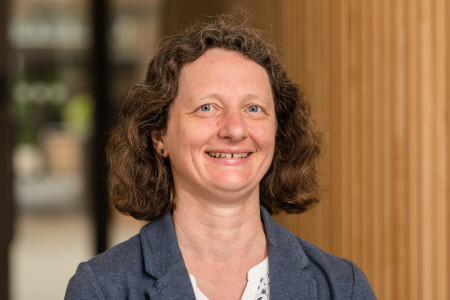
Ms Laura Alexander
Associate Dean, Tuition Delivery, Stem
Biography
Professional biography
After completing an MSci in Physics and Electronics at St Andrews University, I then moved into industry via an MoD graduate programme, so worked towards Chartered Engineer status rather than pursuing a PhD. I gained a broad range of experience in industries as diverse as defence, telecommunications and medical, and became a Chartered Engineer through the IET. In 2017 I completed a Masters in Technology Management with the Open University.
From 2002 I built up a portfolio career with the OU, starting as an Associate Lecturer, before taking on a Staff Tutor role in 2014. Over that time I taught on modules in both science and engineering from first year undergraduate through to postgraduate. Alongside the teaching, I undertook a range of consultancies for the OU, focusing on student support and skills development, particularly maths for Science/Engineering. After a period as Lead Staff Tutor in the School of Physical Sciences, I am currently Associate Dean for Tuition Delivery in the STEM faculty, and still have an Associate Lecturer role on an Engineering module, T276.
My role as Associate Dean for Tuition Delivery began in 2021, coinciding with the introduction of the new AL Contract, when the university moved 4800 Associate Lecturers from casual worker to permanent contracts. Much of my focus during my time in this role has been on integrating our 1400 Associate Lecturers into the STEM faculty as permanent members of staff, building communities to realise the benefits of the change. Working closely with my equivalent Associate Deans in the other 3 faculties and Professional Services staff I have been heavily involved in resolving the various practical, process and systems issues inherent in such a big change.
Research interests
I led an eSTEeM project looking at how students have to adapt their learning skills as they move from online modules to ones with books, or vice versa, and the effects this has on student success, completion and retention (https://www5.open.ac.uk/scholarship-and-innovation/esteem/projects/themes/supporting-students/investigation-how-stem-students-use-learning-resources-different).
I also led an eSTEeM project on supporting Students in Secure Environments (https://www5.open.ac.uk/scholarship-and-innovation/esteem/projects/themes/access-participation-and-success/sise-only-tutor-groups-and-effect-sise-students-and)
In 2017 I completed a project for my MSc in Technology Management on remote working. This involved carrying out a survey of the tools and practices used in the STEM Faculty to facilitate virtual team working. This foreshadowed subsequent events with Covid!
I was involved in an eSTEeM project which looked at sonification of depictions of numerical data to help blind and partially sighted students. The aim was to evaluate an alternative way of getting across the ‘shape’ of a graph that did not involve a subjective written/verbal description. The results were presented in a session at the eSTEeM conference in 2015, and the final report can be found online
Teaching interests
Particular interests in encouraging students to become more confident in using and applying mathematical concepts to solve real life problems, a theme I have focused on in my OU work on both science and engineering modules. I have developed diagnostics for students beginning level 1 modules, created a Maths for Engineering website to provide guidance to these students, and was the Maths Champion on the level 1 Science modules S111 and S112.
I was involved with S104 from its first presentation, facilitating the move to a ‘team teaching’ focused approach to S104 in Scotland well before the introduction of the Group Tuition Policy. I also pioneered the use of Elluminate and then OULive, supporting less confident AL’s in this as it was rolled out more widely. I held a wide range of S104 additional consultancies, including TMA question checking, exam marking and TMA monitoring, ran the S104 national resit forums for a number of years, and was involved in a new initiative to develop a nationwide S104 online revision resource using forums and OULive sessions.
From 2009 to February 2014 I worked as a Pathway Tutor on the Engineering Student Support Team pilot. I was involved from the inception of the project to its handover to the new Student Support Team, and had a key role in its development and success. The Engineering SST pilot was conceived as a geographically disparate project, and pioneered the use of Lync and online document stores as a means of facilitating such a virtual team. Although initially based in the Edinburgh office, I worked mostly from home, with annual face to face meetings. The rest of the team were based in OU offices in Newcastle, Cardiff, Milton Keynes Bristol, Birmingham and Wiltshire. We supported around 4000 engineering students to provide qualification based support, largely via email and phone. This experience of a successful virtual team led to my interest in virtual teams, which I built on through involvement in the Distributed Working Working Group and an MSc Project in this area.
Among other consultancies and contracts I have held with the OU, I have been involved in a range of projects aimed at improving retention, and also at employability and building links with Scottish companies.
I have been involved in various outreach and science education projects with local schools including running a STEM club at our local primary school, Higher (equivalent to A level) projects, WISE (Women into Science and Engineering) events etc, as well as taking part in the Bang Goes the Theory roadshow when it came to Edinburgh.
I have previously acted as chairman of the Ofcom Advisory Committee for Scotland, which has a focus on the availability of broadband to all. The issue of ‘digital poverty’ is important, and I worked to improve understanding of how this can disadvantage people in terms of lack of access to education – something we see at firsthand in the OU.
Publications
Journal Article
Other
Presentation / Conference
Should virtual learning mean on screen learning ? (2020)
How do STEM students use digital and non-digital learning resources? (2019)